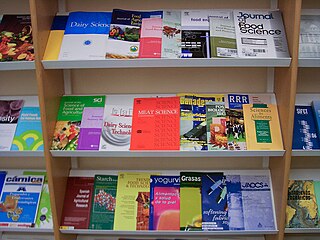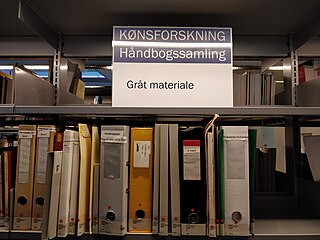Related Research Articles

arXiv is an open-access repository of electronic preprints and postprints approved for posting after moderation, but not peer review. It consists of scientific papers in the fields of mathematics, physics, astronomy, electrical engineering, computer science, quantitative biology, statistics, mathematical finance and economics, which can be accessed online. In many fields of mathematics and physics, almost all scientific papers are self-archived on the arXiv repository before publication in a peer-reviewed journal. Some publishers also grant permission for authors to archive the peer-reviewed postprint. Begun on August 14, 1991, arXiv.org passed the half-million-article milestone on October 3, 2008, had hit a million by the end of 2014 and two million by the end of 2021. As of April 2021, the submission rate is about 16,000 articles per month.
CiteSeerX is a public search engine and digital library for scientific and academic papers, primarily in the fields of computer and information science.

An academic journal or scholarly journal is a periodical publication in which scholarship relating to a particular academic discipline is published. Academic journals serve as permanent and transparent forums for the presentation, scrutiny, and discussion of research. They nearly universally require peer review for research articles or other scrutiny from contemporaries competent and established in their respective fields.

Open access (OA) is a set of principles and a range of practices through which research outputs are distributed online, free of access charges or other barriers. With open access strictly defined, or libre open access, barriers to copying or reuse are also reduced or removed by applying an open license for copyright.
An institutional repository (IR) is an archive for collecting, preserving, and disseminating digital copies of the intellectual output of an institution, particularly a research institution. Academics also utilize their IRs for archiving published works to increase their visibility and collaboration with other academics However, most of these outputs produced by universities are not effectively accessed and shared by researchers and other stakeholders As a result academics should be involved in the implementation and development of an IR project so that they can learn the benefits and purpose of building an IR.

Google Scholar is a freely accessible web search engine that indexes the full text or metadata of scholarly literature across an array of publishing formats and disciplines. Released in beta in November 2004, the Google Scholar index includes peer-reviewed online academic journals and books, conference papers, theses and dissertations, preprints, abstracts, technical reports, and other scholarly literature, including court opinions and patents.

Grey literature is materials and research produced by organizations outside of the traditional commercial or academic publishing and distribution channels. Common grey literature publication types include reports, working papers, government documents, white papers and evaluations. Organizations that produce grey literature include government departments and agencies, civil society or non-governmental organizations, academic centres and departments, and private companies and consultants.
OAIster is an online combined bibliographic catalogue of open access material aggregated using OAI-PMH.
The California Digital Library (CDL) was founded by the University of California in 1997. Under the leadership of then UC President Richard C. Atkinson, the CDL's original mission was to forge a better system for scholarly information management and improved support for teaching and research. In collaboration with the ten University of California Libraries and other partners, CDL assembled one of the world's largest digital research libraries. CDL facilitates the licensing of online materials and develops shared services used throughout the UC system. Building on the foundations of the Melvyl Catalog, CDL has developed one of the largest online library catalogs in the country and works in partnership with the UC campuses to bring the treasures of California's libraries, museums, and cultural heritage organizations to the world. CDL continues to explore how services such as digital curation, scholarly publishing, archiving and preservation support research throughout the information lifecycle.

BASE is a multi-disciplinary search engine to scholarly internet resources, created by Bielefeld University Library in Bielefeld, Germany. It is based on free and open-source software such as Apache Solr and VuFind. It harvests OAI metadata from institutional repositories and other academic digital libraries that implement the Open Archives Initiative Protocol for Metadata Harvesting (OAI-PMH), and then normalizes and indexes the data for searching. In addition to OAI metadata, the library indexes selected web sites and local data collections, all of which can be searched via a single search interface.
SHERPA is an organisation originally set up in 2002 to run and manage the SHERPA Project.
A digital library, also called an online library, an internet library, a digital repository, a library without walls, or a digital collection, is an online database of digital objects that can include text, still images, audio, video, digital documents, or other digital media formats or a library accessible through the internet. Objects can consist of digitized content like print or photographs, as well as originally produced digital content like word processor files or social media posts. In addition to storing content, digital libraries provide means for organizing, searching, and retrieving the content contained in the collection. Digital libraries can vary immensely in size and scope, and can be maintained by individuals or organizations. The digital content may be stored locally, or accessed remotely via computer networks. These information retrieval systems are able to exchange information with each other through interoperability and sustainability.
A disciplinary repository is an online archive containing works or data associated with these works of scholars in a particular subject area. Disciplinary repositories can accept work from scholars from any institution. A disciplinary repository shares the roles of collecting, disseminating, and archiving work with other repositories, but is focused on a particular subject area. These collections can include academic and research papers.

The Registry of Open Access Repositories (ROAR) is a searchable international database indexing the creation, location and growth of open access institutional repositories and their contents. ROAR was created by EPrints at University of Southampton, UK, in 2003. It began as the Institutional Archives Registry and was renamed Registry of Open Access Repositories in 2006. To date, over 3,000 institutional and cross-institutional repositories have been registered.
Data publishing is the act of releasing research data in published form for use by others. It is a practice consisting in preparing certain data or data set(s) for public use thus to make them available to everyone to use as they wish. This practice is an integral part of the open science movement. There is a large and multidisciplinary consensus on the benefits resulting from this practice.

CORE is a service provided by the Knowledge Media Institute based at The Open University, United Kingdom. The goal of the project is to aggregate all open access content distributed across different systems, such as repositories and open access journals, enrich this content using text mining and data mining, and provide free access to it through a set of services. The CORE project also aims to promote open access to scholarly outputs. CORE works closely with digital libraries and institutional repositories.

Open access to scholarly communication in Germany has evolved rapidly since the early 2000s. Publishers Beilstein-Institut, Copernicus Publications, De Gruyter, Knowledge Unlatched, Leibniz Institute for Psychology Information, ScienceOpen, Springer Nature, and Universitätsverlag Göttingen belong to the international Open Access Scholarly Publishers Association.
Open access scholarly communication of Norway can be searched via the Norwegian Open Research Archive (NORA). "A national repository consortium, BIBSYS Brage, operates shared electronic publishing system on behalf of 56 institutions." Cappelen Damm Akademisk, Nordic Open Access Scholarly Publishing, University of Tromsø, and Universitetsforlaget belong to the Open Access Scholarly Publishers Association. Norwegian signatories to the international "Open Access 2020" campaign, launched in 2016, include CRIStin, Norsk institutt for bioøkonomi, Norwegian Institute of Palaeography and Historical Philology, Norwegian University of Science and Technology, Oslo and Akershus University College of Applied Sciences, University of Tromsø, University of Bergen, University of Oslo, and Wikimedia Norge.

In India, Open Access movement started in May 2004, when two workshops were organized by the M S Swaminathan Research Foundation, Chennai. In 2006, the National Knowledge Commission in its recommendations proposed that "access to knowledge is the most fundamental way of increasing the opportunities and reach of individuals and groups". In 2011, the Council of Scientific & Industrial Research (CSIR) began requiring that its grantees provide open access to funded research, the Open Access India forum formulated a draft policy on Open Access for India. The Shodhganga, a digital repository for theses, was also established in 2011 with the aim of promoting and preserving academic research. The University Grants Commission (UGC) made it mandatory for scholars to deposit their theses in Shodhganga, as per the Minimum Standards and Procedure for Award of M. Phil./Ph.D. Degrees Regulations, 2016. Currently, the Directory of Open Access Journals lists 326 open access journals published in India, of which 233 have no fees.
References
- ↑ Norris, Michael; Oppenheim, Charles; Rowland, Fytton (2008). "Finding open access articles using Google, Google Scholar, OAIster and OpenDOAR". Online Information Review. 32 (6): 709–715. doi:10.1108/14684520810923881. S2CID 15068125.
- ↑ Patricia H. Dawson; Sharon Q. Yang (2016). "Institutional Repositories, Open Access and Copyright: What Are the Practices and Implications?" (PDF). Science & Technology Libraries. 35 (4): 279–294. doi:10.1080/0194262X.2016.1224994. S2CID 63819187.